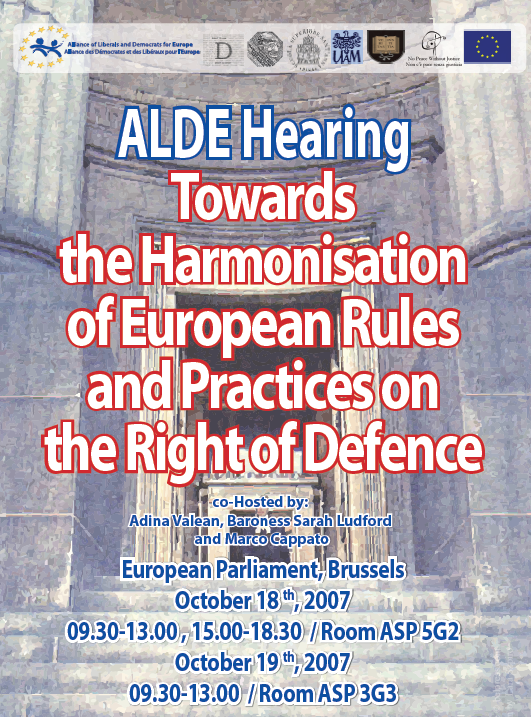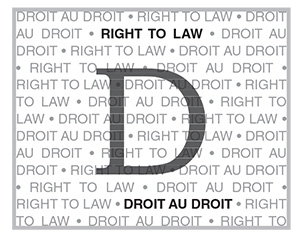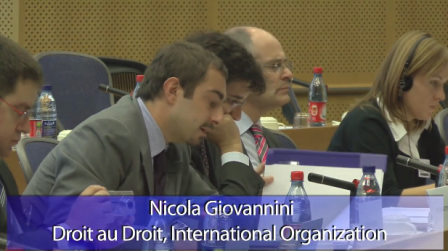 Droit au Droit , in partnership with The Sant'Anna School of Advanced Studies of Pisa (Italy), the Adam Mickiewicz University (Poland) and the Mykolas Romeris University (Lithuania), conducted a project aimed at producing a comparative study on EU Member States enforced domestic legislation and praxis in relation to the safeguard of the rights of defence, especially in pre-trial criminal proceedings and in cases in which cross-borders elements are involved, with the goal to find grounds for European common minimum standards governing procedural law which could lead to ensure a uniform safeguard of fundamental human rights all over the EU.
Droit au Droit , in partnership with The Sant'Anna School of Advanced Studies of Pisa (Italy), the Adam Mickiewicz University (Poland) and the Mykolas Romeris University (Lithuania), conducted a project aimed at producing a comparative study on EU Member States enforced domestic legislation and praxis in relation to the safeguard of the rights of defence, especially in pre-trial criminal proceedings and in cases in which cross-borders elements are involved, with the goal to find grounds for European common minimum standards governing procedural law which could lead to ensure a uniform safeguard of fundamental human rights all over the EU.
Since the adoption of the Amsterdam Treaty and the subsequent European Council of Tampere in 1999, the EU has made great strides in promoting, through the application of the principle of mutual recognition, closer co-operation between police, prosecutors and judges in the fight against international crime (i.e. the adoption of the proposal for a European Arrest Warrant in June 2002). Yet the achievement of a common area of freedom, security and justice implies to ensure, in the same way, the full judicial protection of fundamental individual rights during criminal proceedings. According to the European Constitution, the Union "shall constitute an area of freedom, security and justice with respect for fundamental rights…" (Article III-257). This area should contribute to strengthen, among the others, "the rights of defence" (Art. II-108) and the right "to a fair and public hearing" (Art. II-107).
In spite of several initiatives launched by the European Commission (in particular the proposal for a framework decision covering the rights of suspects and defendants in criminal proceedings throughout the European Union, presented on 28 April 2004 and whose adoption still depends on negotiations in the Council), this dimension is still far from being achieved.
While ensuring bringing to justice of those who had committed a crime, the European legal order has to ensure the judicial protection of Fundamental Rights during criminal proceedings. This double aim calls for an harmonization of norms and practices all over the EU, so that the bringing to justice of defendants is achieved while their right to defence is fully protected. The purpose of this Study was to provide a comparative focus on regulation and praxis in all the EU States and acceding countries with the goal to find grounds for harmonization in relation to the right of defence in the pre-trial phase – i.e. during the period of preliminary investigation before the moment of formal accusation and/or until the decision to prosecute or archive is issued.
The Study aim was to find minimum standards of best practice and rule compatibility which could guarantee fast bringing to justice and due process in the pre-trial stage, focusing in particular on: the right to be informed about the reason of the detention; the right to fair handling of evidence and admission of proof; the right to review decisions and appeal before executing the warrant of arrest. It included the presentation of concrete measures and actions which could be undertaken in order to start a regulation harmonization process and facilitate implementation when cross-border elements are present.
Events
Public hearing: "Towards the harmonisation of European rules and practices on the right of defence", European Parliament, 18-19 October 2007
- Watch the audio-video recording of the Public Hearing
Publications
- Comparative study on EU Member States rules and praxis in relation to the safeguard of the rights of defence
*Project “Toward harmonization of European rules and practice on right of Defence in pre-trial stage: comparative study on state member rules aimed to facilitate police and justice cross-border cooperation” (JLS/2006/AGIS/034). Project leader: Università Sant’Anna di Pisa (IT)
 |
 |
 |
 |

With financial support from the Criminal Justice Programme of the European Union






